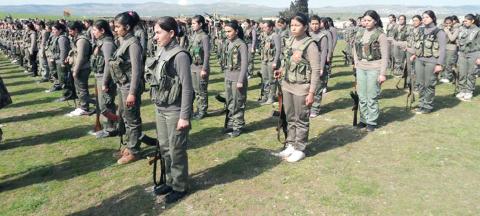About 150 Kurdish women in the war-wracked northern Syrian province of Aleppo have set up a fighting battalion, a monitoring group said on Saturday.
“The Kurdish popular committees have set up the first women’s battalion, comprising some 150 women fighters. The battalion is named the Martyr Rokan Battalion,” the Syrian Observatory for Human Rights said.
“While women are now fighting alongside the rebels, pro-regime forces and Kurdish militia, this is the first women’s battalion as such,” Observatory director Rami Abdel Rahman said.

Photo: AFP / HO / SOHR
The Observatory circulated an amateur photograph of the battalion, showing scores of members in military fatigues, standing in rows before their female leadership.
“Women are now playing a major role in the fighting in Syria,” Abdel Rahman said.
The women’s battalion was announced in Ifrin, the scene late last year of violence pitting Kurdish fighters against Arab rebels fighting the regime of Syrian President Bashar al-Assad.
Al-Assad’s troops pulled out from majority Kurdish areas last year, and while Kurds have been split over the anti-regime revolt in Syria, most have chosen to remain neutral in the conflict.
An agreement in Ras al-Ain on the Turkish border last week brought an end to fighting between Kurds and Islamist rebels, though some activists have described the agreement brokered by a prominent Christian dissident as fragile.
The announcement of the Kurdish women’s battalion comes a month after pro-regime forces set up the National Defense Forces, a paramilitary unit in which women of all ages have been asked to volunteer.
Anti-regime activists have also distributed images of women fighters joining rebel ranks.
“Women are fighting on all the fronts now, though it’s possibly the Islamist rebel ranks that have the fewest women taking part in them,” the Observatory’s Abdel Rahman said.
A female activist in Latakia Province said via the Internet that women often transport weapons and supplies for rebels because they are less likely to be searched at army and security checkpoints.

‘TERRORIST ATTACK’: The convoy of Brigadier General Hamdi Shukri resulted in the ‘martyrdom of five of our armed forces,’ the Presidential Leadership Council said A blast targeting the convoy of a Saudi Arabian-backed armed group killed five in Yemen’s southern city of Aden and injured the commander of the government-allied unit, officials said on Wednesday. “The treacherous terrorist attack targeting the convoy of Brigadier General Hamdi Shukri, commander of the Second Giants Brigade, resulted in the martyrdom of five of our armed forces heroes and the injury of three others,” Yemen’s Saudi Arabia-backed Presidential Leadership Council said in a statement published by Yemeni news agency Saba. A security source told reporters that a car bomb on the side of the road in the Ja’awla area in

PRECARIOUS RELATIONS: Commentators in Saudi Arabia accuse the UAE of growing too bold, backing forces at odds with Saudi interests in various conflicts A Saudi Arabian media campaign targeting the United Arab Emirates (UAE) has deepened the Gulf’s worst row in years, stoking fears of a damaging fall-out in the financial heart of the Middle East. Fiery accusations of rights abuses and betrayal have circulated for weeks in state-run and social media after a brief conflict in Yemen, where Saudi airstrikes quelled an offensive by UAE-backed separatists. The United Arab Emirates is “investing in chaos and supporting secessionists” from Libya to Yemen and the Horn of Africa, Saudi Arabia’s al-Ekhbariya TV charged in a report this week. Such invective has been unheard of

US President Donald Trump on Saturday warned Canada that if it concludes a trade deal with China, he would impose a 100 percent tariff on all goods coming over the border. Relations between the US and its northern neighbor have been rocky since Trump returned to the White House a year ago, with spats over trade and Canadian Prime Minister Mark Carney decrying a “rupture” in the US-led global order. During a visit to Beijing earlier this month, Carney hailed a “new strategic partnership” with China that resulted in a “preliminary, but landmark trade agreement” to reduce tariffs — but

SCAM CLAMPDOWN: About 130 South Korean scam suspects have been sent home since October last year, and 60 more are still waiting for repatriation Dozens of South Koreans allegedly involved in online scams in Cambodia were yesterday returned to South Korea to face investigations in what was the largest group repatriation of Korean criminal suspects from abroad. The 73 South Korean suspects allegedly scammed fellow Koreans out of 48.6 billion won (US$33 million), South Korea said. Upon arrival in South Korea’s Incheon International Airport aboard a chartered plane, the suspects — 65 men and eight women — were sent to police stations. Local TV footage showed the suspects, in handcuffs and wearing masks, being escorted by police officers and boarding buses. They were among about 260 South